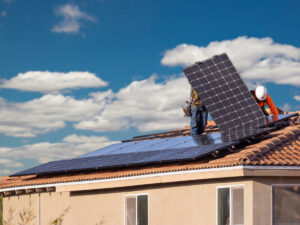The value that solar panels add to a home can vary based on several factors, including location, system size, energy savings, and market trends. Here are some key points to consider:
Location: The value added by solar panels can be influenced by your geographic location. Areas with high electricity rates and ample sunlight tend to see a greater increase in home value from solar installations.
System Size and Energy Production: A larger solar panel system that generates more electricity can potentially add more value to your home. A system that can offset a significant portion of your electricity bill will generally have a greater impact on home value.
Energy Savings: One of the primary benefits of solar panels is the potential for long-term energy savings. Homebuyers may be willing to pay more for a home with lower energy bills, as it can make the property more attractive and affordable to live in.
Market Perception: Solar panels are often viewed as environmentally friendly and energy-efficient additions to a home. This perception can positively influence a buyer's perception of the property's value.
Local Real Estate Market: The impact of solar panels on home value can also be influenced by local real estate market trends. In some areas, homes with solar panels might be in higher demand, leading to an increase in value, while in others, the impact might be more modest.
Incentives and Rebates: Government incentives, tax credits, and utility rebates can make solar panel installations more affordable, which can impact the overall return on investment and the potential increase in home value.
Quality of Installation: The quality of the solar panel installation also matters. A well-installed system that is aesthetically integrated into the home's design and operates efficiently is more likely to add value compared to a poorly installed system.
Ownership vs. Leasing: If you own the solar panel system outright, you're more likely to capture the full increase in home value. However, if you're leasing the panels or using a power purchase agreement (PPA), the impact on home value might be less substantial.
Appraisal Challenges: While solar panels can add value to a home, there can sometimes be challenges in accurately appraising their worth. Not all appraisers are familiar with assessing the value of solar installations, and this can lead to undervaluation. However, efforts are being made to improve the accuracy of appraisals for solar-equipped homes.
Long-Term Investment: Solar panels are a long-term investment, and the value they add to a home might increase over time as energy costs rise and as renewable energy becomes more integral to our energy infrastructure. This can make homes with solar panels more attractive to forward-thinking buyers who are considering the long-term cost of homeownership.
Buyer Perception: Homebuyers who are environmentally conscious or interested in sustainable living might view a solar-equipped home more favorably. The presence of solar panels can demonstrate the homeowner's commitment to renewable energy and reducing their carbon footprint, potentially making the property more appealing.
Resale Potential: Solar panels could potentially make your home stand out in the market. As more people become interested in energy-efficient homes, having a solar panel system could give your property a competitive edge and potentially lead to faster sales.
Cost Recovery: While solar panels can add value, it's important to note that the full cost of the system might not be completely recovered in terms of increased home value. The increase in value may not always match the initial investment due to factors such as depreciation of the panels over time.
Maintenance and Warranty: The maintenance and warranty status of the solar panel system can also influence its impact on home value. A system with a strong warranty and well-documented maintenance history can provide reassurance to potential buyers.
Marketing and Listing: If you decide to sell your home, effectively marketing the solar panel system can help highlight its value. Including information about energy savings, the size of the system, and any warranties can attract buyers who appreciate the benefits of solar energy.
Changing Technology: The solar energy industry is rapidly evolving, with advancements in technology leading to more efficient and cost-effective solar panel systems. This means that newer systems might have a greater impact on home value compared to older ones, as they offer better performance and longer lifespans.
Net Metering and Excess Energy: In areas with net metering policies, homeowners can often sell excess energy generated by their solar panels back to the grid. This can result in additional savings and potential income, which could indirectly enhance the value of the property.
Educating Potential Buyers: When selling a home with solar panels, it's essential to educate potential buyers about the benefits and functioning of the system. Providing information about energy savings, tax incentives, and the positive impact on the environment can help potential buyers understand the added value.
Comparative Market Analysis: If you're considering installing solar panels to boost home value, conducting a comparative market analysis can be beneficial. Look at the sales prices of homes in your area with and without solar panels to get a better understanding of the potential impact on value.
Permitting and Regulations: The permitting and regulatory landscape for solar installations can vary from one jurisdiction to another. Ensuring that your solar panel system complies with local regulations and building codes is essential, as non-compliance could negatively affect the value of your home.
Aesthetic Considerations: While solar panels are becoming more aesthetically pleasing and integrated into home designs, some buyers might still have concerns about the visual impact. High-quality installations that seamlessly blend with the architecture can have a more positive effect on value.
Economic and Energy Market Trends: External factors like changes in energy prices, government policies, and the overall demand for renewable energy can influence the value of a solar-equipped home. Staying informed about these trends can help you make informed decisions about installing solar panels.
Financing Options: If the upfront cost of purchasing solar panels is a concern, various financing options, such as solar loans or leases, can make the installation more accessible. However, these financing arrangements can impact the potential increase in home value, so it's important to weigh the pros and cons.
In conclusion, while solar panels can indeed add value to a home, the specific amount can depend on a range of factors. Some studies suggest that homes with solar panels can sell for a premium, ranging from a few thousand dollars to tens of thousands, depending on the factors mentioned above.
The decision to install solar panels should not solely be driven by potential home value increases, but also by your energy needs, environmental considerations, and long-term financial goals. Before making a decision, it's recommended to consult with solar energy professionals, real estate experts, and financial advisors to fully understand the potential benefits and costs in your unique situation.
If you're considering installing solar panels primarily to increase your home's value, it's a good idea to research local market trends, consult with real estate professionals, and assess the potential return on investment based on your specific circumstances. Keep in mind that the primary benefits of solar panels also include energy savings and environmental sustainability, which can be equally important considerations.

Monday - Friday 7AM to 5PM
Saturday - by appointment only
We proudly serve Green Valley, Marana, Oro Valley, Saddlebrooke, Sahuarita, Tucson, Vail, and the surrounding areas.




